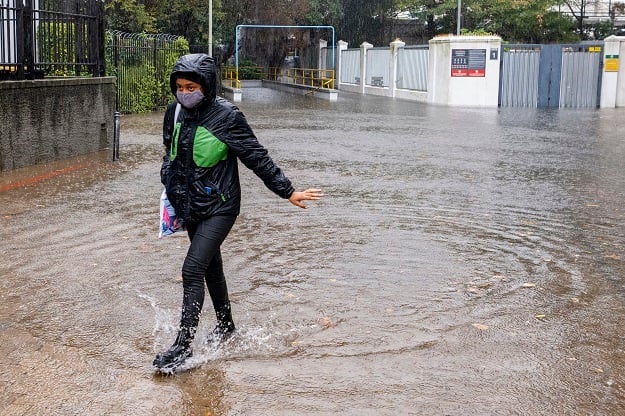- Mop-up operations are under way in Cape Town after some homes were flooded this week.
- Residents even took off from work to remove water from inside their homes.
- Around 100 informal settlements had, by Wednesday, been assessed for damage.
After the flooding in Cape Town this week, the sun came out on Wednesday.
The damage is being assessed, but the floods ruined homes, and a main arterial route in Spine Road partially collapsed.
There were questions as to whether the City of Cape Town was prepared for the floods – as it claimed – with the EFF joining the chorus of criticism.
The EFF said the poor, the vulnerable, and black residents had been left out of the winter preparedness programme – and they were still waiting for promised new piping, sanitation and suitable human settlements.
In the meantime, instead of having a relaxing day off on Thursday to commemorate 16 June 1976, many residents will be scooping water out of their shacks and houses, and counting the cost of floor and furniture damage.
News24 previously reported the average rainfall in Cape Town for June was between 90mm and 100mm – but, since the cold front arrived, rainfall stations in the Cape Metropole recorded between 34mm and 123mm of rain in just 48 hours.
Bishop Lavis resident Samantha Fortuin was one of those sweeping water out of her house. She said:
Bishop Lavis was one of the suburbs most severely hit by the deluge, after a canal overflowed. Neighbouring Bonteheuwel was also affected.
Strandfontein resident Vivian Paulse said that, even though her driveway was still partially covered in water on Wednesday, she had cleared the rain from inside her house. But they still had to dry and air everything, to prevent the children from getting sick.
"My husband and I took off from work today, so that we could sort out the house and try and get everything dried – because I can't stand dampness in my home.
The kids are still young and we can't afford for them to get sick now," she said.
For Nicole Arends, the heavy rainfall was "draining" her pocket.
"Not only did I have to take a few days off from work to sort out my home situation caused by these floods, but I also had to buy more electricity these past few days to keep the house warm.
"I have children under five years old who can't stand the cold. The rain caused so much dampness inside the house, which is making the house extra cold," said Arends.
Crossroads resident Jerome Lukes has some cleaning ahead of him.
"Right now, people must walk in puddles of water. There are lots of residents who are still stuck inside their homes because the water is too high for them to move.
"Some people were able to leave their homes and go stay with family members until the water subsides," he said.
Disaster Management teams say they have assessed approximately 100 informal settlements in the last 48 hours – including Khayelitsha, Nyanga, Delft, Gugulethu, Masiphumulele, Philippi and Langa.
According to Disaster Management spokesperson, Charlotte Powell, they are also liaising with the SA Social Services Agency (Sassa), the Department of Social Development, and NGOs to assist in providing relief to the flooded communities.
Meanwhile, the City's departments continue to attend to weather-related incidents and clearing clogged-up stormwater drains.
On Tuesday, the City said it had prepared extensively for winter, the rainy season in Cape Town, but some of the pipes were either blocked, or could not cope with the extreme quantities of water pushing through the pipes.
Another blocked drain being cleared after #capetownfloods People dump things like cooking oil and motor oil into the drains. This congeals and blocks the catchpits, like a cork. The water runoff from the road has nowhere to go, so bubbles back up and floods.#CapeTown pic.twitter.com/eVm6FUTUgd
— James Styan (@jamesstyan) June 15, 2022
The heavy rain turned freeways into ponds, but this had now been cleared.
However, the partial collapse of Spine Road would take longer to remedy – and, as such, traffic had been diverted.
Some areas, however, are still battling to get their electricity back up again.
Fortunately, no life-threatening situations were reported.
All healthcare facilities in the Western Cape had reopened, after almost 20 clinics were affected by flooding and severe weather conditions on Tuesday.
Three clinics were forced to close, while others experienced disruptions to services because staff could not get in.
Schools affected by the flooding had all reopened, except for one, said Western Cape Education Department (WCED) spokesperson, Bronagh Hammond. Ten schools had closed on Tuesday.
"One school in Kraaifontein is closing early due to ongoing problems with a burst water pipe, which is affecting water and sanitation," said Hammond.
We want to hear your views on the news. Subscribe to News24 to be part of the conversation in the comments section of this article.



